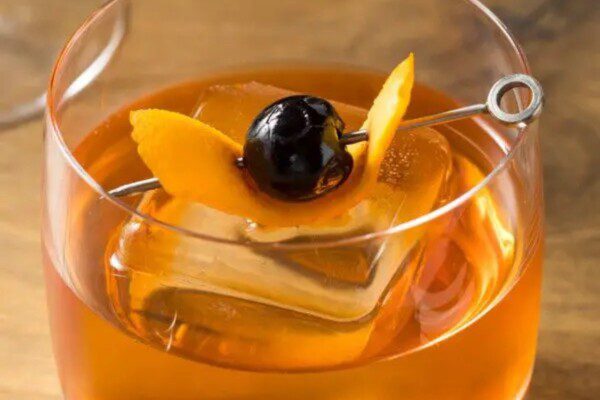The initial mention of a “cock-tail” arose in the form of a recipe for an Old Fashioned. Within the pages of The Balance and Columbian Repository, a publication from Hudson, New York, in an 1806 edition the editor took it upon themselves to provide a definition in response to a curious reader. According to their informative reply, a cocktail represents a potent blend of spirits of any kind, bitters, water, and sugar.
By the late 19th century, this recipe appeared in Barman Harry Johnson’s Bartender’s Manual under the moniker of a Whiskey Cocktail. Its easy built-in-the-glass format, made it a staple on the bar scene. Variations called “Improved” Whiskey Cocktails were everywhere — with recipes calling for absinthe, green Chartreuse, maraschino liqueur, or curaçao. With drinkers less than enthused by these additions they started ordering “Old Fashioned Whiskey Cocktails” to ensure no additions were made. Eventually earning it the title of an Old Fashioned.
During Prohibition, the simple beverage became a concoction of heavily muddled cherry and orange, intended to cover up the poor quality booze at the time. There, it stayed in limbo until the 2000s craft cocktail revival, bringing back the original known and endeared recipe. Today, the many Old Fashioned variations celebrate the history of the cocktail and make a welcome addition to your home bar repertoire.
1. Classic Old Fashioned

The traditional recipe with bourbon, sugar, Angostura bitters, and water has withstood 220 years of history. It’s spirit-forward, with the right amount of sweet and bitter to balance it out — the “perfect” cocktail.
2. Improved Whiskey Cocktail

The Improved Whiskey Cocktail is updated from the 1887 variation, stirring whiskey, Angostura bitters, and sugar together while adding absinthe, maraschino liqueur, and Peychaud’s bitters for added complexity.
3. Rum Old Fashioned

Purists might balk at Old Fashioned riffs without a whiskey base, but the traditional recipe lends itself to spirits of all kinds. This dark rum variation resembles the original, with oaky notes coming through the rum aging process.
4. Oaxaca Old Fashioned

The Oaxaca Old Fashioned is a smoky agave rendition of the Old Fashioned and the first modern riff. The 2007 recipe harnesses mezcal, adding smooth tequila and agave syrup to soften the flavor, with a couple of dashes of Angostura bitters to round it off.
5. Maple Old Fashioned

Mix the caramelly vanilla notes of maple syrup with either the nectary or dark sweetness of rum, add a couple of dashes of bitters and an orange twist for an Old Fashioned variation that still tastes traditional. Experiment with different rums for your favorite variation.
6. The Coffee House

The spicy rye or rounded bourbon flavor complements the bitter notes of coffee in this Old Fashioned variation. The recipe creates a smooth sipper by using coffee liqueur, whiskey, and Angostura bitters.
7. Añejo Old Fashioned

Not all tequila cocktails need to be shaken, and this Añejo Old Fashioned is a testament to this. Made with agave nectar, Angostura bitters, Añejo tequila, orange peel, and a brandied cherry, its aged tequila flavor is familiar yet intriguing.
8. C&B Old Fashioned

Gin’s power lies in its duality. It can take control, like in a potent Martini, or blend in, like in a refreshing Gimlet. In the C&B Old Fashioned it does both. Stirring gin, Campari, Lillet Blanc, Benedictine, and Cointreau together is a refreshing drink — a departure from its namesake.
9. Irish Old Fashioned

The classic Old Fashioned recipes often use American bourbon or rye as a base, but Irish whiskey takes the stage in this riff. The whiskey is already sweeter, getting an herbal, sweet depth from Benedictine and blended together with Angostura bitters and orange bitters, making a slightly softer variation of the original Old Fashioned recipe.
10. Hazelnut Old Fashioned

